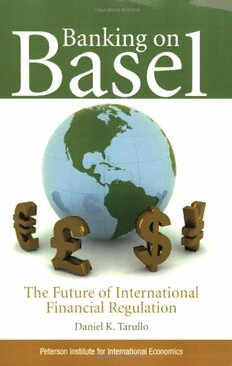Download Banking on Basel: The Future of International Financial Regulation PDF Free - Full Version
Download Banking on Basel: The Future of International Financial Regulation by Daniel K. Tarullo in PDF format completely FREE. No registration required, no payment needed. Get instant access to this valuable resource on PDFdrive.to!
About Banking on Basel: The Future of International Financial Regulation
The turmoil in financial markets that resulted from the 2007 subprime mortgage crisis in the United States indicates the need to dramatically transform regulation and supervision of financial institutions. Would these institutions have been sounder if the 2004 Revised Framework on International Convergence of Capital Measurement and Capital Standards (Basel II accord) negotiated between 1999 and 2004 had already been fully implemented? Basel II represents a dramatic change in capital regulation of large banks in the countries represented on the Basel Committee on Banking Supervision: Its internal ratings-based approaches to capital regulation will allow large banks to use their own credit risk models to set minimum capital requirements. The Basel Committee itself implicitly acknowledged in spring 2008 that the revised framework would not have been adequate to contain the risks exposed by the subprime crisis and needed strengthening. This crisis has highlighted two more basic questions about Basel II: One, is the method of capital regulation incorporated in the revised framework fundamentally misguided? Two, even if the basic Basel II approach has promise as a paradigm for domestic regulation, is the effort at extensive international harmonization of capital rules and supervisory practice useful and appropriate? This book provides the answers. It evaluates Basel II as a bank regulatory paradigm and as an international arrangement, considers some possible alternatives, and recommends significant changes in the arrangement.
Detailed Information
| Author: | Daniel K. Tarullo |
|---|---|
| Publication Year: | 2008 |
| ISBN: | 9781435692268 |
| Pages: | 327 |
| Language: | English |
| File Size: | 1.323 |
| Format: | |
| Price: | FREE |
Safe & Secure Download - No registration required
Why Choose PDFdrive for Your Free Banking on Basel: The Future of International Financial Regulation Download?
- 100% Free: No hidden fees or subscriptions required for one book every day.
- No Registration: Immediate access is available without creating accounts for one book every day.
- Safe and Secure: Clean downloads without malware or viruses
- Multiple Formats: PDF, MOBI, Mpub,... optimized for all devices
- Educational Resource: Supporting knowledge sharing and learning
Frequently Asked Questions
Is it really free to download Banking on Basel: The Future of International Financial Regulation PDF?
Yes, on https://PDFdrive.to you can download Banking on Basel: The Future of International Financial Regulation by Daniel K. Tarullo completely free. We don't require any payment, subscription, or registration to access this PDF file. For 3 books every day.
How can I read Banking on Basel: The Future of International Financial Regulation on my mobile device?
After downloading Banking on Basel: The Future of International Financial Regulation PDF, you can open it with any PDF reader app on your phone or tablet. We recommend using Adobe Acrobat Reader, Apple Books, or Google Play Books for the best reading experience.
Is this the full version of Banking on Basel: The Future of International Financial Regulation?
Yes, this is the complete PDF version of Banking on Basel: The Future of International Financial Regulation by Daniel K. Tarullo. You will be able to read the entire content as in the printed version without missing any pages.
Is it legal to download Banking on Basel: The Future of International Financial Regulation PDF for free?
https://PDFdrive.to provides links to free educational resources available online. We do not store any files on our servers. Please be aware of copyright laws in your country before downloading.
The materials shared are intended for research, educational, and personal use in accordance with fair use principles.

